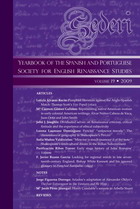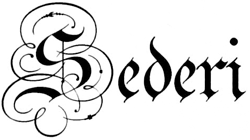
Sederi 19
Sederi 19 — 2009
EDITOR
Ana Sáez-Hidalgo
REVIEW EDITOR
Francisco José Borge López
ISSN 1135-7789
Lorena Laureano Domínguez, “Pericles’ ‘unknown travels’: The dimensions of geography in Shakespeare’s Pericles.” SEDERI 19 (2009): 73-99.
DOI: https://doi.org/10.34136/sederi.2009.4 Download PDF
Abstract
The present essay explores the complex notion of geography and its manifold implications in Shakespeare’s first romance, Pericles. It will be argued that the role of geography and travelling in the play cannot be reduced to a mere formal strategy. In the play’s treatment and representation of geography, psychological, moral and political aspects intertwine. Thus Pericles can be understood simultaneously as an individual’s life journey, as a spiritual journey, and even as an exploration of different forms of government and power. Taking as a point of departure John Gillies’ concept of “geographic imagination” and Freud’s notion of “the uncanny,” I will focus on the psychological meaning and on the poetic and dramatic effectiveness of the author’s imaginative use of geography. Examination of the different locations demonstrates that, beyond their existence as specific external spaces, they are relevant as inner mental entities informing Pericles’ experience and acquiring meaning within the hero’s microcosm. With a special emphasis on the incest scene, it will be contended that in Pericles the geographical and the psychological fuse and that geographical locations work as different layers of the psyche. Geography will be analysed in relation to plot and characters, always taking into consideration its allegorical, psychological and poetic dimensions.
Keywords: Shakespeare; Pericles; geography; space; psychoanalysis; barbarian; the uncanny.
References
Felperin, Howard 1972. Shakespearean Romance. Princeton: Princeton University Press.
Freud, Sigmund 2001 (1919). “The Uncanny.” Ed. Vincent B. Leith. Norton Anthology of Theory and Criticism. New York: Norton & Company: 929-952.
Frye, Northrop 1957. Anatomy of Criticism. Princeton: Princeton University Press.
Gesner, Carol 1970. Shakespeare and the Greek Romance: A study of Origins. Lexington: Kentucky University Press.
Gillies, John 1994. Shakespeare and the Geography of Difference. Cambridge: Cambridge University Press.
Gillies, John 2005. “Place and Space in Three Late Plays.” Ed. Richard Dutton and Jean E. Howard. A Companion to Shakespeare’s Works (Vol.IV): The Poems, Problem Comedies, Late Plays. London: Blackwell: 175-193.
Hoeniger, David F. 1982. “Gower and Shakespeare in Pericles.” Shakespeare Quarterly 33/4: 461-479.
Hopkins, Lisa 2000. “The Shores of my Mortality”: Pericles’ Greece of the Mind.” Ed. David Skeele. Pericles: Critical Essays. New York: Garland: 228-237.
Hurwitz, Gregg Andrew 2002. “A Tempest, a Birth and Death: Freud, Jung and Shakespeare’s Pericles.” Sexuality and Culture 6/3: 3-73.
Kahn, Coppélia 1980. “The Providential Tempest and the Shakespearean Family.” Eds. Murray M. Schwartz and Coppélia Kahn. Representing Shakespeare: New Psychoanalytic Essays. Baltimore and London: The Johns Hopkins University Press: 217-243.
Kiefer, Frederick 1991. “Art, Nature, and Language in Pericles.” University of Toronto Quarterly 61/2: 207-225.
Luis Martínez, Zenón 2002. In Words and Deeds: The Spectacle of Incest in English Renaissance Tragedy. Amsterdam and New York: Rodopi.
McJannet, Linda 1998. “Genre and Geography: The Eastern Mediterranean in Pericles and The Comedy of Errors.” Eds. John Gillies and Virginia Mason Vaughan. Playing the Globe: Genre and Geography in English Renaissance Drama. Madison and London: Fairleigh Dickinson University Press: 86-106
Moore, Jeanie Grant 2003. “Riddled Romance: Kingship and Kinship in Pericles.” Rocky Mountain Review 57/1: 33-48.
Nevo, Ruth 1993. “The Perils of Pericles.” Ed. B.J. Sokol. The Undiscover’d Country: New Essays on Psychoanalysis and Shakespeare. London: Free Association Books: 150-178.
Relihan, Constance C. 1992. “Liminal Geography: Pericles and the Politics of Place.” Philological Quarterly 71/3: 281-299.
Saenger, Michel Baird 2000. “Pericles and the Burlesque of Romance.” Ed. David Skeele. Pericles: Critical Essays. New York: Garland: 192-204.
Shakespeare, William 1998 (1609). Pericles. Eds. Doreen DelVecchio and Antony Hammond. Cambridge: Cambridge University Press.
Shakespeare, William and George Wilkins 2003 (1609). Pericles. Ed. Roger Warren. Oxford: Oxford University Press.
Shakespeare, William and George Wilkins 2004 (1609). Pericles. Ed. Suzanne Gossett. London: Arden Shakespeare.
Shakespeare, William 1996 (1623). The Winter’s Tale. Ed. Stephen Orgel. The Oxford Shakespeare. Oxford: Oxford University Press.
Shakespeare, William 2005 (1623). Cymbeline. Ed. Martin Butler. The New Cambridge Shakespeare. Cambridge: Cambridge University Press.
Shakespeare, William 2002 (1623). The Tempest. Ed. David Lindley. The New Cambridge Shakespeare. Cambridge: Cambridge University Press.
Skeele, David 1998. Thwarting the Wayward Seas: A Critical and Theatrical History of Shakespeare’s Pericles in the Nineteenth and Twentieth Centuries. Newark: University of Delaware Press.
Skeele, David 2000. “Pericles in Criticism and Production: A Brief History.” Ed. D. Skeele Pericles: Critical Essays. New York and London: Garland: 1-33.
Tillyard, E.M.W. 1972 (1943). The Elizabethan World Picture. London: Penguin Books.
Traversi, Derek 1979 (1954). Shakespeare: The Last Phase. London: Hollis & Carter.
Warren, Roger 1990. Staging Shakespeare’s Late Plays. Oxford: Clarendon Press.
